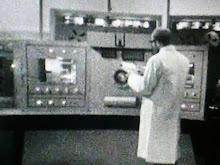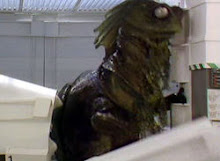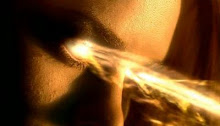We can be sure, at least, that wormholes work. Which is to say, we can be sure we won't look stupid if we bring them up in conversation. We know this because Carl Sagan told us so. Needing a way to bring humans and aliens into Contact, and not wanting to resort to anything silly like spaceships travelling faster than light in real-space, he concluded that the most feasible method of travelling bbbillions and bbbillions of miles in order to meet one's own dead dad was to interpret General Relativity in a rather dynamic way. This idea wasn't new, and the w-word had been used by a rather apologetic John Wheeler in the '50s, but it's informed every generation of nuts-and-bolts sci-fi since 1985. Nobody has yet proved wormholes impossible. In theory, they're still the fastest way to get from A to A-but-on-the-other-side-of-space.
Note the sentiment buried in that logic, though. It's a sentiment - perhaps in more than one sense of the word - that's found even in Sagan's own musings. Not wanting to resort to anything silly like faster-than-light travel. Current Scientific Thinking is an awkward, chimerical thing, always slippery, always mutable, but mutable in surprising ways. Thankfully, and despite the best attempts of creationists to suggest otherwise, it's well aware of its own nature: yet even so, there are principles for which even the most flagellantly self-analytical physicist feels an attraction stronger than reason. You don't mess with the speed of light, even if the Standard Model is incomplete. And you don't try to outwit the Laws of Thermodynamics, especially not the second one.
This last point is interesting for historical reasons. On the surface, the nineteenth century was "just" another era in which science continued to get the upper hand over slack-jawed dribbling assumption, as were the Renaissance, the Enlightenment, and the early Industrial Revolution (divide those up into smaller mecha-geological periods as you see fit). The difference is that all of these previous movements had put the Arts Scientifick within a Christian framework, or a Muslim framework if you consider what the Islamic world was up to while we were getting medieval on each others' asses. During the 1800s, science realised / was permitted to point out that no monotheistic God was influencing the equations, let alone marking anyone's homework. The most profound effect of this wasn't the rise of atheism, the decline of religion, or some Dawkinsian crusade towards a definitive post-sacred Truth: in a way, quite the reverse. A much more fundamental result was the sensation, now so common that most of us take it for granted, that nobody had prepared a finale.
Consider the consequences. Before the age of Darwin and Maxwell, even science had a millenarian approach to the universe, a belief - never fully defined, never fully formulated - in some carefully-arranged end point. The appropriately God-awful phrase "intelligent design" would describe most scientific thought before the twentieth century, far beyond mere biology. Famously, the Whig model of human existence took it for granted that every epoch was an improvement on the last, and Whig history went hand-in-hand with the notion of scientific progress even as late as the 1960s. We were definitely heading somewhere, towards an inevitable New Jerusalem, if not exactly the New Testament version then certainly a guiding light at the end of time.
And then, within a generation, it transpired that we weren't. Evolution may not have been an entirely random process, but the understanding of natural selection showed that nobody was making plans. It was as if the cosmos had left us at a motorway service station with £3.50 in sandwich-money, then driven off into the night (a suggestion there of abandonment by parents, but we'll come to that). And if evolution was bad, entropy was catastrophically non-catastrophic. The Laws of Thermodynamics had become formalised by the mid-1800s. Not only did we not have a final destination, but everything was falling apart faster than it could be repaired. Creation was grinding to a halt, and despite what many of us may have picked up from "Logopolis", it wouldn't make a groovy green CSO effect before it went.
One might think that by embracing the Second Law more passionately than any other principle, the physicists of the world are at worst obsessed with the absolute extinction of all life, at best just very intelligent goths. In fact, the acceptance of entropy is what finally freed science. It must have occurred to the majority of people reading this blog that those with the most apocalyptic religious beliefs, those who both expect and eagerly await a final judgement on Goodies and Baddies, just seem to want their dads to step in and sort everything out. To accept that you're going to die is a form of maturity; to accept that everything dies, but to continue to care about it anyway, might arguably be seen as the greatest achievement of either an individual or a culture. You see what I mean about scientists having a sentimental attraction for certain parts of the cosmic model. Sir Arthur Stanley Eddington described entropy as holding "the supreme position among the laws of Nature". It's impossible to frame this in a context without some sense of emotion.
"There is something lamentable, degrading, and almost insane in pursuing the visionary schemes of past ages with dogged determination... the history of Perpetual Motion is a history of the fool-hardiness of either half-learned, or totally ignorant persons." So wrote Henry Dircks, as long ago as 1861, after he'd made a survey of all those who'd tried to produce infinite work / energy in clear breach of the Laws. Those who've attempted to build a perpetual motion machine, to violate the greatest of inviolables, have traditionally been seen as not only misguided but... delusional. Childish, even. And we have been, of course. Millions, literally millions of human beings since the nineteenth century have attempted to build such machines, not all of them adults. Kathy Sykes, the televisual physicist, admitted that she spent much of her childhood trying to do it with Lego. Leaving aside the point that this clearly makes her the ideal woman, she can hardly be alone.
This in itself tells us something interesting. When grown-ups try to make devices that effectively generate something out of nothing, we can assume they generally do it because some entropic instinct is telling them that FOR CHRIST'S SAKE, I DON'T WANT TO DIE IN THIS INCREASINGLY COLD AND ULTIMATELY FUTILE UNIVERSE. It's hard to imagine a six-year-old having the same impulse, although H. P. Lovecraft may have come close. It seems likely that there's an element of challenge involved here. Tell a child to do anything and they'll do the opposite. Tell an intelligent child that something is impossible - an intelligent child like, ooh, maybe the kind who used to watch Doctor Who when it was about things - and they'll try to prove that it isn't. But even beyond that...
All right, let's ask the question, and let's answer it with our instincts. Pretend you've never heard of thermodynamics; pretend you don't know that Maxwell's Demon is as much a product of superstition as every other kind. Why can't you build a perpetual motion machine?
After all, so much in nature's universe tempts us to believe that it's not just possible, but inevitable. Newton showed that an object set in motion, if left unmolested by gravity, atmosphere, and all those other nuisances of friction you find on Earth, should carry on indefinitely. Sadly those nuisances of friction include any machine you might build in order to exploit the process, but nonetheless, the subconscious message we're given is that Things Go On Forever. All schoolchildren are, or were, taught that if you push an object in outer space then it'll keep moving. Often provoking awkward questions about what happens when it hits the edge of the universe, questions which may be even more tangled now. (I'm not a racist, but do you remember how neat our galactic neighbourhood was before all the dark matter moved in and started overcrowding it? I've heard you can get up to 1.898E27 kilograms of superdense material into one council flat.) With true-but-misleading lessons like these found in most childhoods, is it honestly so ridiculous for someone to believe they can construct a device that literally gives 110%...? Efficiency, that is.
Six years ago, I designed a perpetual motion machine of my own. I didn't actually set out to do this: I was watching a documentary about water wheels (look, I'm Homo BBC4, all right?), and found myself niggled. Two sets of facts, both of which had been explained to me as "true", seemed to contradict each other. The result apparently went against Maxwell's equations, so something was clearly wrong somewhere.
My machine was purely theoretical. It couldn't be constructed on present-day Earth, because it relies on the ability to artificially engineer wormholes. But nobody's ever proved that to be impossible, and if Carl Sagan can accept it as the basis of an argument, then I'm sure you can.
Here's the diagram. And I've already copyrighted it © 2006, so hands off.
It's really very simple. The core of the device is a vertical tube, within the gravitational field of a planet (or any other sizeable body). A projectile, let's just call it a metal ball, is dropped into the tube. It turns the "water wheel", and the energy is stored in whatever medium suits you. After that, the ball falls to the bottom of the tube and enters your wormhole. The wormhole has been arranged, and space-time carefully folded, so that the "exit" of the wormhole is at the top of the tube. Travelling from bottom to top without actually being lifted, the ball begins its journey again. The wheel keeps turning. Infinite energy is produced.
No, I couldn't see the problem either. But I'm one of the half-learned.
The obvious difficulty - I say difficulty, not flaw - is that entropy strikes at the heart of the machine. The ball will wear down the wheel; the machinery will fall apart. But this ceases to be a problem when you realise the vast amounts of energy being produced out of nowhere, more than enough to fuel a self-repair system. Vast energy permits the replacement of matter, so it's an engineering problem, not a problem with the physics. (And if you're prepared to countenance the wormholes, then something clever involving nanites is probably going to be on the cards.) This aside, it all looked moderately rational.
Given my background, however, it seemed... a little unlikely that I'd found a way of punching entropy in the face. I took it to a few of my more academically-scientific acquaintances, and asked them what the problem was. Now, this may be a constant peril when laypersons ask questions about theoretical physics without a BBC2 voice-over to hand, but their answers weren't terribly illuminating. Among other things, they speculated that the gravity would in effect "run out": a difficult proposition for me to grasp, given that every model for gravity I've seen (or do I mean metaphor for gravity...?) has presented it as a side-effect of the nature of space-time, not a finite quantity. I couldn't really worm a de-vagued version out of anyone, and my elementary research into gravitational potential energy didn't help much. The suggestion was also raised that the engineering of wormholes might in itself require infinite energy before infinite energy could be generated, although if you're going to assume that the universal rules re: the warping of space-time have been deliberately fixed in order to protect the Laws of Thermodynamics, then you might as well just write GOD SAYS NO on the diagram.
A few weeks later, I was invited to a book-signing in London. Not just me, natch, since my own gravity isn't yet sufficient to pull in a crowd on my own. I was there signing (among other things) About Time; seated next to me was the author of The Science of Doctor Who, the sort of book that everyone had been expecting for ages, but apparently rushed into production after the 2005 series bulldozed everything else in broadcasting while standing on ITV's throat. I was, I admit, rather unfair that afternoon. As you may know, The Science of Doctor Who was a rather - ahem - svelte book, whereas About Time eventually took up six volumes and increasingly felt as if it were made of dwarf-star alloy. Its multi-million-word bulk had already covered most of the pop-science areas in The Science of, and this allowed me to show off like nobody's business. "Oh, so you've gone for quantum entanglement as the most likely answer to teleportation?" I'd say. "We discussed that possibility in the essay under 'Nightmare of Eden', but we concluded that..." And so on.
Nevertheless, my neighbour during that signing was a proper science writer (and, later, the author of How to Destroy the Universe... I don't think I was that mean to him). At the end of the day, I drew my design on a piece of paper - I remember it being a napkin, but probably only because it's always a napkin in these stories - and asked him why it didn't do what I thought it did. He frowned a bit and made some interested "mmm" noises, but ultimately agreed that he didn't know either. He took it away for further analysis. I never heard from him again.
There are two notable points here, which between them mean that the Wormhole Water Wheel has done its job, at least as a personal thought-experiment. Firstly: though I still don't know exactly what's wrong with it, it doesn't immediately look stupid to people who know a lot more about physics than I do, which is more than you can say for most perpetual motion machines. Secondly: it's raised questions in my own mind about the very nature of "stupid", and the way sentimentality - or, if you prefer, basic human need - influences our sense of speculation even when we think we're being wholly scientific. More than once while I was touting my impossible machine, I was left with the sense that the explanations as it Why It Didn't Work were based on the assumption that It Can't Possibly Work, even that the universe required safety protocols to ensure its failure... meaning, they weren't exactly explanations.
A third and incidental point is that the diagram would make a really nice T-shirt.
As adults, the contempt we feel for perpetual motion is as instinctive as our childhood belief that it must surely be possible. Often, such designs have been the symbol of absurd, irrational folly: I particularly like their status in Vonnegut's Hocus Pocus, his almost dinosaur-like description of them as the fossils of doomed ambition. Yet it takes an above-average understanding of physics to spot the hitch in the Wormhole Water Wheel, whatever the f*** it is. The very concept requires wormhole engineering as well as conventional Newtonian physics. Might we not at least speculate, then, that some even more exotic and unlikely combination of not-impossible elements might do exactly what the Water Wheel is intended to do? Ultimately, the Laws of Thermodynamics are considered unbreakable for two principle reasons. One is that no observation has ever been made which contradicts them, although this is possibly the most contentious area it's possible for a human being to enter. (Which is to say, the question "when has something ever come out of nothing?" could well be answered with the question "what are you currently standing in?". It's not unreasonable to suggest that "universe" and "a breach of the Laws of Thermodynamics" are synonymous... not unreasonable, but unprovable, at least for now.)
The second reason has less to do with observation than with history. Culturally, we need entropy: without it, we become children again. This is why, like the offspring of an abusive parent, we're inclined to defend it even though we secretly want it to go away and stop hurting us. It's not that we have a death-wish, it's just that our awareness of our own ultimate doom is what stops us behaving as if we can expect the Rapture at any moment. This doesn't mean we should consider its inviolability to be "true", nor should we deny the possibility that one day a Wormhole Water Wheel 2.0 will actually turn out to be workable, if only as a theoretical possibility.
Then again, I would say that. Because I don't want to die. And because I still find it perfectly acceptable - this time for reasons that are political as much as historical, or at least grounded in a sense of human creativity and human compassion - that there might be an Omega Point waiting for us at the end of time, a light at the end of a near-total darkness. A light of our own making.
None of which has very much to do with Doctor Who, at least not directly. Unless I'm a splinter of a Jagaroth whose future incarnation is trying to push you juuust a little bit further.














































































